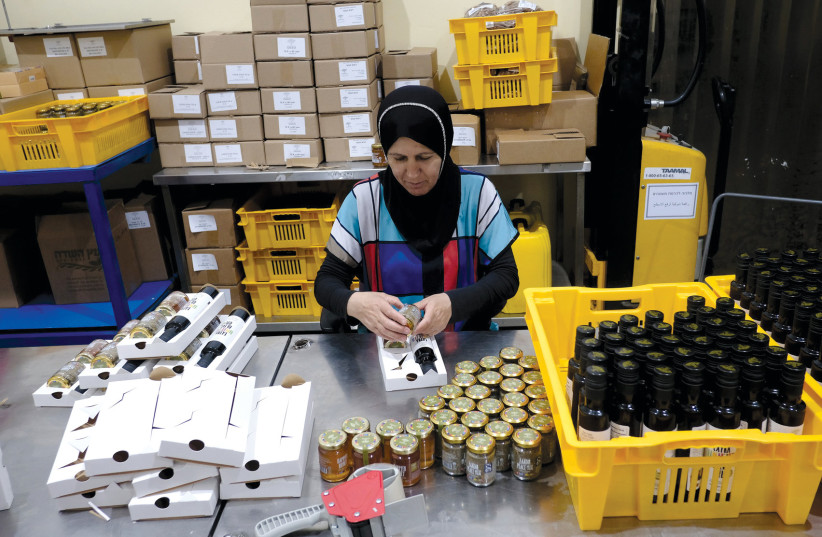Kafr Kanna – According to Christian tradition, this town not far from Nazareth is where Jesus turned water into wine. Now at Sindyanna, Arab and Jewish women are turning olives into olive oil, and hoping to turn war into peace at the same time.
Nisreen Amar, one of Sindyanna’s longtime production workers, says she is thrilled to be working at Sindyanna.
“It is sometimes difficult for Arab women to find jobs that are appropriate for them,” she said. “It is sometimes difficult for women to work if they have to take care of the house and the children.”
Sindyanna is a non-profit organization led by Arab and Jewish women that aims to foster change from the ground upward. Although 20% of Israel’s citizens are Arabs, Arabs and Jewish Israelis rarely have more than a passing acquaintance with each other.
“Sindyanna was a kind of start-up,” said Hadas Lahav, the group’s founder, in an interview in the organization’s Visitor’s Center. “We were trying to think how Jewish and Arab women could collaborate in order to build something that will be sustainable, profitable, and economically justified.”

The olive oil has colorful labels designed by children of the women involved. It says the olive oil is “extra unified,” “extra positive” and “extra peaceful.”
It is also one of the few olive oil producers recognized as “fair trade,” meaning it is organic and meets certain criteria of sustainability and fair employment practices.
The olive oil has won many awards including being named one of the world’s top 100 Extra Virgin Olive Oils. They ship their products, which include the spice za’atar, carob syrup, almonds, honey and olive oil soap, all over the world.
What is unique about the NGO is that all profits are channeled into education for Arab-Israeli women. Arab women are under-represented in the Israeli economy, especially in jobs that require a higher education. Only 26% of Arab-Israeli women work outside the home, while about two-thirds of Jewish women do so.
One of the goals of Sindyanna, established in 1996, is to offer Arab women educational opportunities that will bring them into the workforce.
The pandemic has hit Sindyanna hard, as it has almost all NGOs. The visitor’s center used to host almost every day international tourists who would come to learn about the center, and often bought the products to take home. For the first two years of the pandemic, the center was closed except for the production line. Now a few Israeli groups make their way there, like a group of several dozen pensioners who came recently to learn about the Sindyanna and do a workshop making za’atar.
“We wanted to bring change to both societies, the Arab society and the Jewish society,” said Hanan Zoabi, one of Sindyanna’s organizers. “If we want to make a change, we can’t leave Arab women on the margins. We use the oil we make to subsidize our social projects.”
For the Jewish women involved, it’s a chance to learn about Arab culture during the olive harvest, and take Arabic classes at the center. The women work together to harvest olives, and study traditional crafts like basket weaving.
They also work with 200 local Arab olive oil producers, helping them reach an international market.
The Sindyanna is an oak tree and a symbol of connection to the land. The women at Sindyanna say they are making a better future for both Arabs and Jews in Israel. ■
For more information go to sindyanna.com
